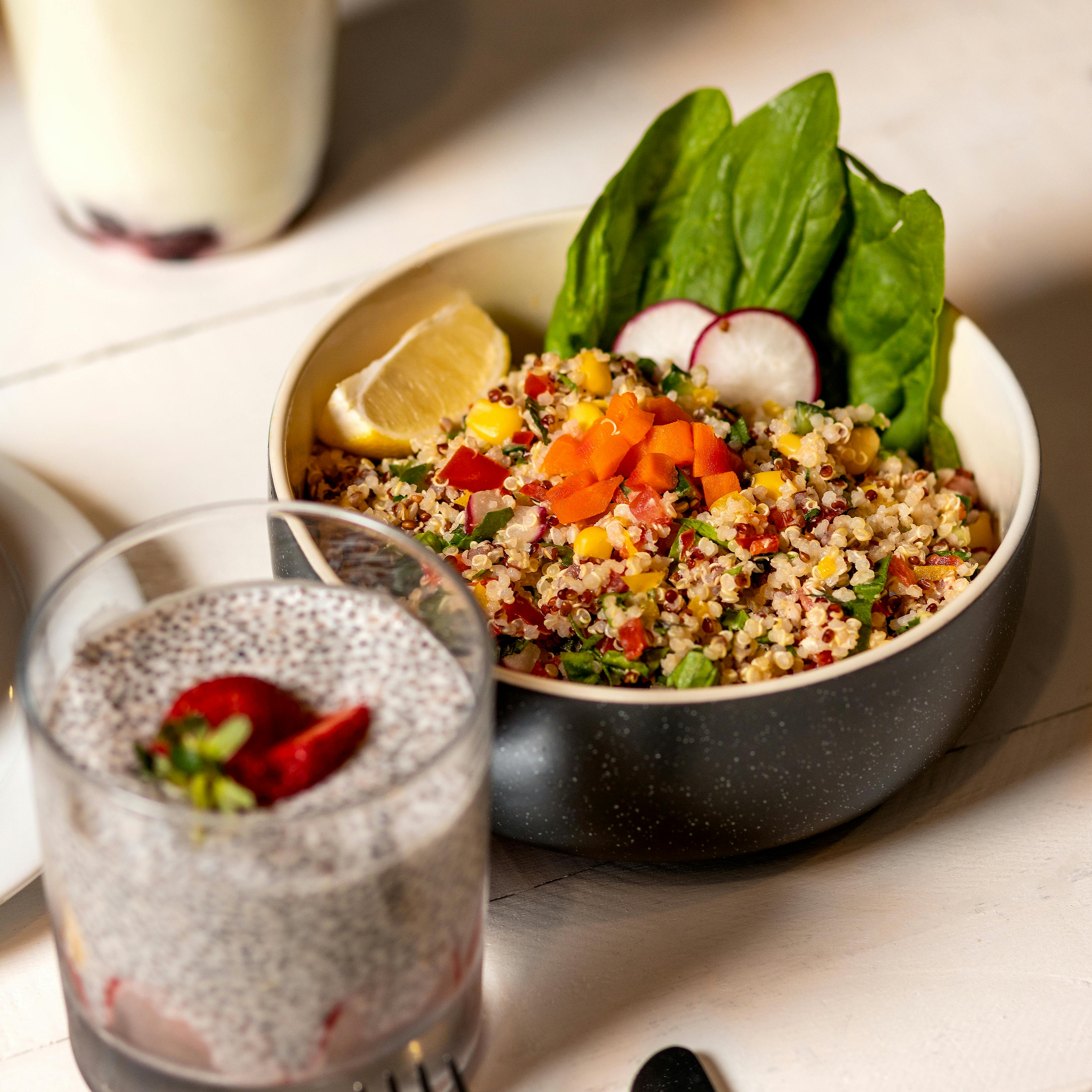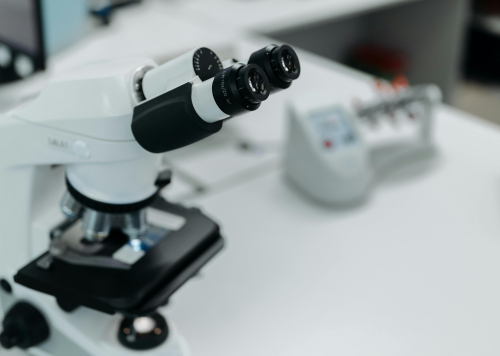Longevity foods: How nutrition shapes how you age
The correlation between what you eat and how long you might live in good health is actually very strong.
9
min read
18
References
Share
link copied

Key takeaways
- Nutrition plays a major role in longevity — diets rich in fruits, vegetables, whole grains, legumes, and healthy fats are linked to longer life expectancy and a lower risk of chronic disease.
- Macronutrients like protein, healthy fats, and complex carbs, along with micronutrients such as vitamins A, D, C, and B12, zinc, and omega-3s, support cellular repair, metabolic health, and healthy ageing.
- Limiting processed foods, added sugars, and excessive alcohol while maintaining good sleep, regular exercise, and social connection helps promote a longer, healthier life.
We know that eating a nutritious diet keeps us in good health, but can it also impact how long we live?
As it turns out, the foods you put in your body almost certainly affect your longevity – that is, the number of years you live in good health. There’s a bunch of research demonstrating that a balanced diet, as well as a few specific foods and food groups, may help you live a longer and healthier life that’s less prone to chronic disease.
Here’s a deep dive into the link between nutrition and longevity.
How does nutrition impact longevity?
As longevity has become a more buzzworthy topic, an increasing body of research has emerged on just how much nutrition matters to your lifespan.
Now, researchers know that the correlation between what you eat and how long you might live in good health is actually very strong. Nutrition underpins your overall health, and when properly optimised, you’re more likely to sustain that health long-term.
For instance, a global study found that switching from an unhealthy diet to a healthier one (based on the Australian dietary guidelines) can increase life expectancy by 8.9 years for men and 8.6 years for women.
Transitioning to a diet specifically linked to longevity (that is, one filled with fruit, veg, legumes, nuts and whole grains) can boost life expectancy even more – 10.8 years for men and 10.4 years for women [1].
A 2020 review also stated that nutrition is one of the biggest lifestyle factors that affects health and lifespan. It found that the main healthy dietary patterns that can extend life include calorie restriction (lower energy intake without malnutrition), the Mediterranean diet, and eating healthier foods such as whole grains, veg, fruits, nuts and coffee – all of which were associated with a decreased risk of death from any cause [2].
The role of macronutrients in healthy ageing
Macronutrients – also known as ‘macros’ – are the nutrients your body requires in large amounts to function properly. The three main types of macronutrients are carbohydrates, proteins and fats – here’s how they impact the way you age:
- Carbohydrates: Carbohydrates are your body’s primary source of energy. However, research suggests that excessive carbohydrate intake – particularly from refined carbohydrates like white bread and sugary snacks – can actually speed up ageing [3]. Complex carbs like whole grains and legumes are a more nourishing choice.
- Proteins: Many health experts agree that protein should be a primary focus in your diet, especially as you get older. Protein helps prevent age-related muscle mass and strength loss, allowing you to live more comfortably and be more physically independent [4]. On the other hand, low protein intake is associated with frailty and mobility issues in later life [3].
- Fats: Healthy unsaturated fats – found in foods like fatty fish, olive oil, nuts, seeds and avocado – are associated with a reduced risk of death from several serious diseases [5]. Monounsaturated fats in particular are linked to lower inflammation, better brain health and less frailty [3].
The role of micronutrients in healthy ageing
Micronutrients include all the vitamins and minerals your body needs in smaller amounts. Think vitamins A through K, and minerals such as iron, calcium, zinc, selenium and magnesium.
While all of them are fundamental, some may be more conducive to healthy ageing. According to research, the most important micronutrients to support healthy ageing are vitamin A, vitamin D, vitamin C, B vitamins (particularly B-12), zinc and omega-3 fatty acids [6]. All of these support the immune system, helping to defend your body against illness. Many of them also maintain the health of organs your eyes, heart and brain.
Other research endorses B6, B9 (folate), B12, D and K specifically, as they support energy metabolism, brain health, immunity and bone strength [7].
What are antioxidants and why do they matter for longevity?
Antioxidants are compounds that fight free radicals – unstable molecules that enter the body via pollution, radiation and other stressors, and can eventually cause damage. Excessive free radicals can accumulate and put your body in oxidative stress, a condition linked to ageing and several diseases.
Because antioxidants can neutralise free radicals, they can prevent oxidative stress. This is why ensuring you get enough of them in your diet is so crucial to your longevity.
The best foods for healthy longevity
So, what exactly should you be eating to try to extend your lifespan?
Several foods offer myriad health benefits and are well worth adding to your fridge and pantry. Try to include a diversity of them in your diet – this ensures you’re getting a wide mix of macronutrients, vitamins and minerals.
Plant-based foods
- Leafy greens like spinach, kale and rocket (high in vitamin K, iron, folate, calcium and antioxidants)
- Cruciferous vegetables such as broccoli, Brussels sprouts and cabbage (high in vitamin C, fibre, folate and sulphur compounds that support detoxification)
- Legumes like lentils, chickpeas, black beans and soybeans (high in plant protein, fibre, iron and B vitamins)
- Colourful vegetables such as capsicum, carrots, tomatoes and beetroot (high in beta-carotene, vitamin C, potassium and antioxidants like lycopene)
- Fresh fruits high in antioxidants like berries, citrus, apples and pomegranate (high in vitamin C, polyphenols, fibre and flavonoids)
- Mushrooms such as shiitake and oyster varieties (high in B vitamins, selenium, vitamin D when exposed to sunlight, and antioxidants)
- Fermented foods like sauerkraut, kimchi and kefir (rich in probiotics, beneficial bacteria and enzymes that support gut health)
- Green tea (high in catechins and polyphenols, which act as powerful antioxidants)
Healthy fats
- Extra virgin olive oil (high in monounsaturated fats, vitamin E and anti-inflammatory polyphenols)
- Avocados (high in healthy fats, potassium, fibre and folate)
- Nuts such as walnuts, almonds, pistachios and macadamias (high in healthy fats, protein, magnesium and vitamin E)
- Seeds like chia, flax, hemp, sunflower and pumpkin (high in omega-3s, fibre, zinc and plant protein)
- Fatty fish such as salmon, sardines, mackerel and trout (high in omega-3 fatty acids EPA and DHA, vitamin D and selenium)
- Dark chocolate or cocoa (high in flavonoids, magnesium and antioxidants – best enjoyed in small amounts)
Protein sources
- Fish and seafood (high in lean protein, omega-3s, iodine and selenium)
- Eggs (high in complete protein, vitamin D, choline and B vitamins)
- Poultry such as chicken and turkey (high in lean protein, niacin, selenium and vitamin B6)
- Legumes and lentils (high in fibre, plant protein, iron and magnesium)
- Proteins like tofu and tempeh (high in complete plant protein, calcium and isoflavones)
- Greek or natural yoghurt (high in protein, probiotics, calcium and vitamin B12)
- Nuts and seeds (high in healthy fats, plant protein, vitamin E and minerals like zinc and magnesium)
Whole grains and fibre-rich foods
- Oats (high in beta-glucan fibre, manganese and magnesium)
- Quinoa (high in complete protein, iron, fibre and magnesium)
- Brown or wild rice (high in fibre, B vitamins and selenium)
- Wholemeal pasta and bread (high in complex carbohydrates, fibre and B vitamins)
- Barley and farro (high in fibre, selenium and magnesium)
- Sweet potatoes and other root vegetables (high in beta-carotene, vitamin C, potassium and fibre)
- Bran, psyllium husk and other high-fibre cereals (high in soluble and insoluble fibre that support digestion and heart health)
Foods to limit or avoid for longevity
While numerous foods have the potential to boost longevity, many others have been found to have the opposite effect. We’re not saying you have to give them up entirely; instead, enjoy them in moderation as part of a healthy diet that mostly contains those nutrient-dense foods we mentioned earlier.
Red and processed meats
Several studies have linked excessive consumption of red and processed meats to a higher risk of chronic diseases and premature death [8].
Refined carbohydrates
Refined carbohydrates include white bread, white pasta, cereals, commercially prepared baked goods, and white rice. These cause rapid blood sugar spikes and contribute to insulin resistance.
Added sugars
The odd treat here and there likely won’t do much harm, but eventually, eating too much sugar can lead to a host of health issues.
Ultra-processed foods (UPFs)
More and more research is emerging on the link between UPFs and health issues, and their impact on longevity. Currently, frequent consumption has been associated with higher mortality and cognitive decline [9].
Trans and saturated fats
While good fats can support healthy ageing, others like trans fats and saturated fats can do the opposite. Research shows that trans fats – found in foods like margarine and commercially prepared baked goods – have the potential to increase inflammation and raise LDL (“bad”) cholesterol [10][11].
Too much salt
Consuming too much sodium can contribute to high blood pressure [12].
Excessive alcohol consumption
Excessive drinking (that is, more than 14 units of alcohol per week)[13] has the potential to damage your liver and other organs, which can cause accelerated ageing.
Other lifestyle factors that influence life expectancy
Besides nutrition, these other habits can affect how you age:
Physical activity
Regular movement helps preserve muscle and bone strength, muscle mass and mobility, plus it keeps your heart in good shape.
Aim for a minimum of 150 minutes of moderate-intensity movement sessions each week, which includes a mix of cardio (to support heart health), strength training (to maintain your muscles and bones) and mobility training (to keep your joints and ligaments working properly).
Sleep quality
Sleep is fundamental to good health. Getting enough good-quality sleep allows your cells to repair, supports brain function and keeps your hormones in balance. As you age, poor sleep can speed up cognitive decline.
If you struggle with sleep, there are a few things you can do to try and improve it: minimise screens for about an hour before bedtime; ensure your bedroom is dark, cool and quiet; go to bed and wake up at the same time each day; and limit caffeine after midday.
Stress management
Chronic stress can accelerate cellular ageing because it raises cortisol levels and can trigger inflammation. Needless to say, doing your best to keep stress under control may slow ageing.
Simple stress relievers include meditation, deep breathing exercises, yoga, journaling and spending time in nature.
Social connection
Maintaining strong relationships throughout your life supports both your mental and physical health. In fact, there’s evidence that socially connected people tend to live longer, while loneliness can increase mortality risk [14].
Social connection could look like regular meet-ups with family and friends, joining a local club or group, volunteering or even just chatting with people at work.
Engaging your brain
There’s ample research demonstrating just how important it is to keep your brain active – especially as you get older – to ward off neurodegenerative conditions [15].
Engaging in activities like reading, puzzles and creative hobbies, and learning new skills, all help build your cognitive reserve.
Avoiding smoking and pollutants
Smoking is a known contributor to premature ageing, with research showing that it can damage your DNA, affect the health of your blood vessels and accelerate skin ageing [16][17][18].
It probably goes without saying that avoiding cigarettes could slow down the onset of age-related disease.
Sun safety
Here in Australia, sun exposure is always a risk, even in the cooler months. Sun protection is absolutely essential. It helps protect your skin from skin cancer and premature ageing – in fact, UV radiation is one of the biggest contributors to wrinkles and loss of skin elasticity.
Image credit: Pexels
Give this a go:
No items found.
Juniper patients lose
13%
body weight in 4 months
Based on a peer-reviewed study of Juniper patients on
one of our treatment plans
DOI: 10.1089/tmr.2024.0058
Drag the slider below to input your start weight
80kg
In four months, patients at your start weight have lost:
14kg
References
- https://www.nature.com/articles/s43016-023-00868-w
- https://pubmed.ncbi.nlm.nih.gov/31631676/
- https://pmc.ncbi.nlm.nih.gov/articles/PMC9229969/
- https://www.ncbi.nlm.nih.gov/books/NBK594226/
- https://nutritionsource.hsph.harvard.edu/2016/07/05/different-dietary-fat-different-risk-of-mortality/
- https://pmc.ncbi.nlm.nih.gov/articles/PMC8308403/
- https://www.sciencedirect.com/science/article/pii/S0047637425000387
- https://pmc.ncbi.nlm.nih.gov/articles/PMC6971786/
- https://www.sciencedirect.com/science/article/pii/S2274580724006344
- https://pmc.ncbi.nlm.nih.gov/articles/PMC3247279/
- https://www.mayoclinic.org/diseases-conditions/high-blood-cholesterol/in-depth/trans-fat/art-20046114
- https://www.heart.org/en/news/2021/05/26/how-much-harm-can-a-little-excess-salt-do-plenty
- https://www.nhs.uk/live-well/alcohol-advice/the-risks-of-drinking-too-much/
- https://hsph.harvard.edu/news/the-importance-of-connections-ways-to-live-a-longer-healthier-life/
- https://www.health.harvard.edu/mind-and-mood/12-ways-to-keep-your-brain-young
- https://pmc.ncbi.nlm.nih.gov/articles/PMC6546629/
- https://www.nhlbi.nih.gov/health/heart/smoking
- https://pmc.ncbi.nlm.nih.gov/articles/PMC8330869/
See all

Filed under:






.jpg)
